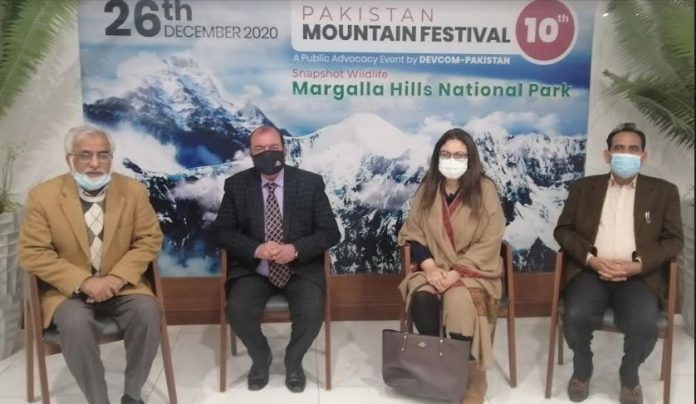DNA
ISLAMABAD, DEC 26 – The experts speaking at an event on Saturday urged the authorities and government institutions to control undue human interventions and constructions in the Margalla Hills National Park to protect the habitats of wildlife. Most of the efforts are focused on hills alone while the Rawal Lake and Shakarparian area are flooded with construction and visitors. We need to control incoming vehicles and visitors and strictly restrict change in the land-use within the MHNP boundaries.
They urged the authorities to work according to their mandate and scope of work without any influence, and discrimination to conserve the natural ecosystems and habitats of the Margalla Hills National Park (MHNP). Communities shall be taken onboard and engaged in the wildlife and protection efforts.
Stringent implementation of laws, capacity building of communities to understand the importance of the habitat they are living in, and participation of citizens and other stakeholders are very important in planning and implementation of the plans for the National Park. Islamabad Wildlife Management Board (IWMB) and other public institutions shall be strengthened with more budget, staff and with necessary amendments in the legislative framework.
The event “Snapshot Wildlife Margalla Hills National Park” was organized by the Development Communications Network (Devcom-Pakistan) and DTN in connection with the 10th Pakistan Mountain Festival on Saturday in collaboration with Mivida Pakistan and Pakistan Wildlife Foundation (PWF).
The Islamabad Wildlife Management Board (IWMB) chairperson Rina Saeed Khan was the guest of honour on the occasion. The speakers included former Deputy Director General WWF Pakistan and biodiversity expert Dr. EJaz Ahmed, Executive Director Devcom-Pakistan Munir Ahmed, former Director National Council of Conservation for Wildlife (NCCW) Umeed Khalid, Dr Muhammad Rafi, and Vice Chairman PWF Safwan Shahab Ahmed.
The young wildlife photographer Abdul Hadi gave a pictorial presentation of the MHNP wildlife. The young conservationists who spoke on the occasion included Minahil Safwan, Sana, and Shaaref Munir.
IWMB chairperson Rina Saeed Khan said PKR 1.8 billion PC-I has been submitted to the Ministry of Climate Change for approval. The funding will help strengthen the IWMB while the new initiatives in the pipeline include conversion of the zoo to a wildlife conservation centre, developing and maintaining the trails in the MHNP, wildlife rescue service, and a centre for the National Park services.
She said IWMB was established under the instructions of Islamabad High Court in 2005 since then it lacked funds and staff. Hopefully it will come up as a strong institution in the near future. All stakeholders and communities living within the park would be taken on board for all the initiatives planned in the MHNP.
Devcom-Pakistan Executive Director Munir Ahmed said undue human interventions in the national park is the result of failure of the government authorities that could not ensure the implementation of its legal framework. Mafias are ruling over the National Park without any hesitation and hindrance. There is no check and control over the change of land-use. Even the CDA has given blank chit to the many businesses to unduly expand and come up with eye-soaring construction of hotels, restaurants and houses. Heavy street lights, massive traffic and no system of sewage and solid waste management are the main challenges which are being ignored by the hand-cuffed government institutions.
Dr Ejaz Ahmed said we mainly focus on the hills while the Rawal Lake and Shakarparian shall also be looked after. These areas are heavily encroached by the government and private constructions. The cultural centres attract a huge number of visitors and the stress causes extinction of biodiversity and wildlife habitats.
Umeed Khalid suggested a close collaboration between Islamabad and Khyber Pakhtunkhwa government on the conservation efforts for wildlife and biodiversity being interlinked mountain habitats. We need to provide wildlife a well-conserved corridor for their movement.
Safwan Shahab said we need to adhere to laws strictly and check the land-use change. Stakeholders and communities are not included in the planning stage for any initiative being taken in the National Park. Citizens are seen nowhere in the planning and monitoring of the projects. Same is the case of the Margalla Hills National Park. We need to understand and realize that the National park is an asset for us, and we need to protect its biological and natural heritage.
Shaaref Munir, a student of Hospitality and Tourism Business Management at the Özyeğin University (Istanbul) said that wildlife could bring paid-tourism such as safaris in the National Park. Government shall restrict the movement of vehicles, and construction of buildings in the park to allow free movement of wildlife. It will help improve the ecosystems and habitats.

















